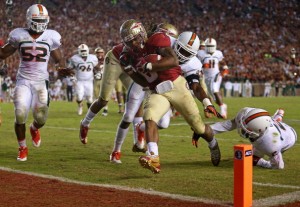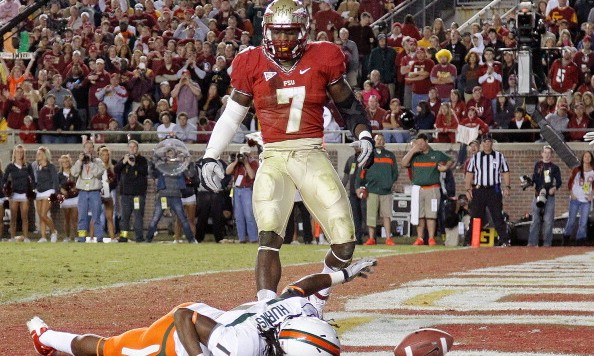The game on Saturday isn’t just for the players currently on the teams. At last count, there were 34 recruits from across the country who confirmed that they would be in Tallahassee for the annual rivalry match-up between the Miami Hurricanes and Florida State Seminoles. A large majority are the homegrown talent from the state of Florida, whose teams are constantly battling for supremacy in certain areas. Perhaps no two teams in the nation have the amount of personal tension between players as Miami and FSU.
Anyone with a basic knowledge of Florida recruiting can tell you how valuable Dade and Broward County are for teams wishing to be competitive on the national level. Rivals records that 21 players from Miami over the past three years were classified as blue chip recruits, which are 4-star and 5-star players. Almost all of them went to one Florida’s “Big Three” of Florida, FSU, and Miami. That storyline is worthy of further discussion, but the point is clearly made: Secure the Florida talent, and you’ll start winning.
The number of players for both Miami and FSU who were at one point leaning to the other team is hard to quantify. Commitments are a bit easier to track down, but the sheer nature of recruiting means the decision is much more tumultuous than outsiders know.
The last second change-of-hearts and missed opportunities spark questions from coaches and fans alike about how their team might have done better with the other guy…or worse. Miami has found itself on the losing side of this battle for the past five years now. Some of the best FSU performances against Miami have come from players who were raised in the Hurricanes’ backyard.

TALLAHASSEE, FL – NOVEMBER 02: Devonta Freeman #8 of the Florida State Seminoles scores a touchdown during a game against the Miami Hurricanes at Doak Campbell Stadium on November 2, 2013 in Tallahassee, Florida. (Photo by Mike Ehrmann/Getty Images)
Devonta Freeman, current starting running back for the Atlanta Falcons, was one the players best known for having big performances against his hometown team. In three contests against Miami, he racked up 224 rushing yards, 119 receiving yards, and five total touchdowns while averaging 5.0 yards-per-carry. In 2013, Freeman became the first FSU running back to eclipse 1,000 yards rushing in a season since Warrick Dunn in 1996. This trend with running backs seems to have continued with Dalvin Cook, who amounted for over 100 yards and two touchdowns in his lone game against the Hurricanes. Cook hopes to extend that streak this Saturday.
But it’s not just the stat sheet stuffers that fill Miami coaches with regret. It’s NFL draftees like Xavier Rhodes and Mike Harris — both coming out of Dade County and making immediate impacts with FSU.
It’s 5-star recruits like Matthew Thomas and Ermon Lane, who keep the Seminoles near the top of recruiting rankings. In the long run, it isn’t especially important that every single player from the area contributes — the sheer fact that Jimbo Fisher and his staff reestablished a Miami pipeline is instrumental in the continued success of the program.
We use the term “reestablished” because the end of the Bobby Bowden era saw the recruiting efforts take a backseat to whatever it was being put on the field. It certainly wasn’t wins…though that’s neither here nor there.
The point is that Florida State’s efforts down south greatly diminished before the resurgence under Fisher. A quick survey of the rosters in 2008 and 2009 show only around three players from the area on each team.
More recent years in 2013 and 2014 have six and 11 per respective team, which may not sound like much of a difference initially, but these aren’t just 2-star players or permanent backups. These are guys like Dalvin Cook or Devonta Freeman — players who have been the foundations of recent national championship contending teams.
What happens on the field is the most important result of the weekend, but the recruiting aspect is not far behind it. A big win for either team will undoubtedly give them a momentum to carry their efforts throughout the rest of the season. A loss will not only give up bragging rights, but also damage the pitch that either school is trying to sell.
Regardless of the outcome, you can bet that both teams understand the magnitude of what they play for Saturday.




















